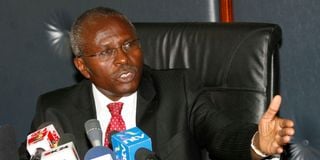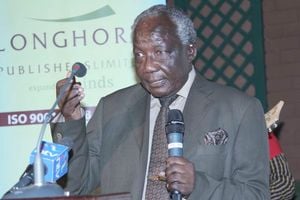
Former Permanent Secretary Karega Mutahi.
Professor Karega Mutahi was a man of remarkable determination and unwavering integrity. As one of the few permanent secretaries to transition seamlessly from the Kanu era into the Mwai Kibaki regime, he exemplified resilience and adaptability in a landscape often marred by political intrigue. Those who knew him would attest that integrity was synonymous with his name, even as he navigated the treacherous waters of a political arena rife with conniving agendas. There were attempts to besmirch his character, but when he died this week, he left with his name intact.
Throughout his distinguished career, Prof Mutahi stood firm in his principles, earning respect and admiration for his commitment to education and public service. He was “Mwalimu” to his peers, and “Prof” to his former students.
Influenced by a childhood defined by his father’s absence, Prof Mutahi forged his own destiny. He always talked about his struggles to get the education he desired – and wore his victory as a symbol of determination. He was a professor who never passed through a traditional secondary school, which illustrates the essence of private studies.
In 1963, Prof Mutahi’s dream of a secondary education faded into oblivion as his poor mother could not afford to take him to secondary school. Thus, the young boy from Mathioya, Murang’a County was left at a crossroads; clutching impressive scores in his Certificate of Primary Education: an A in English, a B in Mathematics, and a D in General Paper. With no prospects for further schooling, he stepped into the realm of work, becoming an untrained teacher at Kiru Primary School. Here, he was at the mercy of the school board, which saw his potential.
The establishment of Kigari Teachers Training College in Embu heralded a new chapter for him, offering him entry into foundational teacher training. In 1963, and with a primary school certificate, one could join a teaching college and graduate as a P3 teacher to teach lower primary as an assistant Grade II. Prof Mutahi opted for this route.
Always looking for opportunities, after graduating from Kigari Teachers College, Prof Mutahi then sat for the Kenya English Test, as he privately studied for the Kenya Junior Secondary Examination (KJSE), typically reserved for Form Two students. By this time, he was teaching in Thika. He not only passed his KJSE, but with remarkable audacity he enrolled as a private candidate for his O-levels in 1967, emerging triumphantly with a Division Two. The following year, he tackled A-level exams, further solidifying his academic prowess.
This unconventional journey shaped Prof Mutahi’s character. He became resilient. His success in A-levels opened doors to the University of Nairobi, where he completed a Bachelor of Arts in Linguistics and Political Science in 1973, and was admitted to the University of California in Los Angeles for a Master’s degree. Prof Mutahi returned home as a tutorial fellow and registered as a PhD student, graduating from the University of Nairobi in 1978. His ascent in academia culminated in a professorship in linguistics at the same university.
For the late Prof, his journey had just started. In the academic world, he was distinguished and became an authority in Gikuyu oral literature. He had various academic papers to his name. More so, together with Gakaara wa Wanjau and Ngugi wa Thiong’o, they started developing the writing of standard Gikuyu language, which saw the development of new metalinguistic Kikuyu terms for vowels and consonants.
But in 2002, his journey to contribute towards this chosen path took a new turn after President Moi appointed him to become the chairman of the Coffee Board of Kenya. He would later be appointed the permanent secretary in the Ministry of Research, Technical Training and Applied Technology – and traverse the corridors of power in various ministries and two presidencies.
Known for his reserved demeanour, few were aware during his tenure as Permanent Secretary under President Moi that his brother, Njeru Kirira, held the prestigious role of Financial Secretary at the Treasury. Concerns about Prof Mutahi’s age surfaced upon his appointment as Education Permanent Secretary in Kibaki’s government while his brother, Njeru Kirira, had been retired due to age. There were claims that they were twins, but parliamentary proceedings clarified their differing retirement ages.
Prof Mutahi’s service spanned four ministries under both Kibaki and Moi’s regimes. Notably, under his stewardship, President Kibaki’s administration rolled out free primary and secondary education, fundamentally transforming access to education across the nation.
His tenure at the Ministry of Education was marked by ambitious reforms aimed at democratising access to higher education. A significant moment came when he and the ministry’s technical team, chaired by Prof Kabiru Kinyanjui, proposed integrating regular and parallel university programmes. In a letter dated May 14, 2007, Prof Mutahi directed key stakeholders, including the Commission for Higher Education (CHE) and public university vice-chancellors, to implement immediate recommendations from the report. Among these was the de-linking of admissions from the availability of university hostel spaces, aiming to integrate all students under one system. He urged universities to expedite these changes, emphasising the necessity for progress.
As an academic and technocrat, he envisioned a unified system where 16,000 students admitted annually could blend seamlessly with those entering through the parallel track. However, some vice-chancellors deemed the proposal unfeasible, arguing it would stretch resources and dilute quality.
In 2006, Prof Mutahi spearheaded the partnership between Kenya and Rwanda, which saw the deployment of the first cohort of Kenyan teachers sent to Rwanda. While this ambitious endeavour earned him accolades from Rwandan officials, it sparked controversy at home. The Kenya National Union of Teachers (KNUT) opposed this deployment, contending that it exacerbated staffing shortages within Kenya, particularly in rural schools. Nevertheless, Prof Mutahi remained a steadfast advocate for the programme, viewing it as a vision of East African solidarity in educational development. Thus, Prof Mutahi skilfully navigated this delicate balance between national educational priorities and the broader goal of fostering regional cooperation.
In the murky waters of politics, Prof Mutahi was caught up the in row between Prime Minister Raila Odinga and President Mwai Kibaki during the Grand Coalition term after the 2008 post-election chaos.
In 2009, as the PS for Education, he issued a directive that allowed Muslim students to wear hijabs in Catholic-sponsored schools. This initiative reflected his commitment to religious diversity and students’ rights.
As allegations emerged in 2010 relating to embezzled funds from the Free Primary Education, when he was a PS, Prof Mutahi was under pressure to resign together with Cabinet minister Prof Sam Ongeri. By then, the UK and the US had suspended funding due to a reported loss of Sh600 million, casting a spotlight on accountability challenges within Kenya’s educational system. An audit found that approximately 60 percent of the lost funds were reportedly disbursed through transactions made between 2008 and 2009, with irregularities such as altered disbursement schedules and duplicate payments to schools noted.
This episode illuminated the systemic challenges that Prof Mutahi faced while striving to advance Kenya’s educational landscape. It revealed the complexities and vulnerabilities in managing large-scale government programmes where any misstep could ruin careers. Although he was subsequently transferred to the Ministry of Local Government, this chapter of his career stood as a sobering reminder of the messy bureaucratic structures within the ministry. At the Ministry of Local Government, he was to oversee the transfer of power to the county governments.
But in February 2010, Prof Mutahi, alongside four other permanent secretaries, was interdicted over the handling of the free primary school programme while others were over scandals surrounding the subsidised maize scheme. Though he took political responsibility, Prof Mutahi was never perceived as one of the hydra-heads of sleaze.
His pragmatism earned him accolades from peers, including Prof Olive Mugenda, who described him as a practical leader who saw tasks through to completion. Among his notable contributions was that he later chaired the operationalisation committee for Kenyatta University Hospital, steering the project to fruition and leaving a lasting impact on the education sector.
Prof Mutahi's legacy stands as a complex interplay of ambition, reform, and the relentless pursuit of excellence. His story embodies the struggles and triumphs of a man committed to uplifting himself through education, and later navigating the turbulent waters of public service.
@johnkamau1







